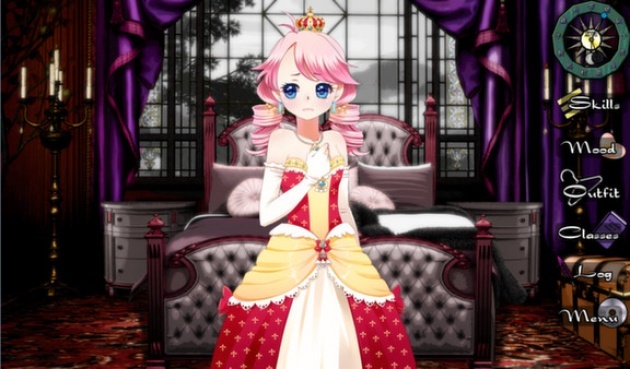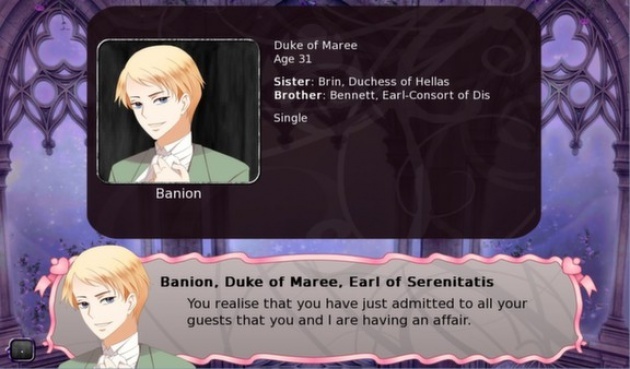Long Live the Queen (PC) Review
By Jordan Hurst  24.08.2015
24.08.2015

Long Live the Queen deserves more of a reputation as one of the great video game bait-and-switches, along with Metal Gear Solid 2 and Spec Ops: The Line. While it's not nearly as psychologically manipulative as those titles, it still manages to smuggle a shadowy political narrative and a stat-heavy RPG onto Steam under the guise of a princess-themed visual novel. For some reason, however (maybe the average Western gamer doesn't realise how abnormal this sort of thing is), it hasn't earned the same notoriety as similarly genre-swapped products. Oddly, the primary talking point most people have latched onto is the game's difficulty (which is only as high as the player wants it to be), ignoring the fact that "elegance" is a trainable statistic in the same game that contains multiple opportunities for player-mandated decapitation.
The seemingly innocuous premise that allows this scenario is that Elodie, the most naïve princess in fiction, has been thrust into the spotlight shortly after her 14th birthday due to her mother's sudden demise. Over the next 40 weeks, she must learn as much as she can about everything before she comes of age and is crowned queen of her late-medieval monarchy. The reason this premise is "seemingly" innocuous is that Elodie is very likely to suffer the same fate as her mother during those 40 weeks, due to either her own mistakes or the complex web of scheming nobles that surround her. Furthermore, nearly absolute control over her choices is given, both brutal and benevolent, except those that are off-limits due to failed skill checks.
These choices and skill checks form the bulk of the gameplay. Each week, Elodie must choose two subjects to study - ranging from musical ability to military prowess - as well as a weekend activity, which will affect her mood, which will in turn affect her future willingness to learn certain subjects. The 42 available skills and eight potential moods are a lot to absorb at first, especially while also keeping track of the setting's interlocking history and ongoing power struggles, but exploiting it all is uniquely satisfying. No other game allows its users to order forced marriages as a negotiating tactic or raise a hunting falcon as a last-resort bodyguard, and it's that range and eccentricity that makes Long Live the Queen riotously entertaining, even when it feels like it shouldn't be.

Being part visual novel, Long Live the Queen's engagement is situational - derived from presentation, themes, and progression, rather than player interaction. For that reason, it doesn't really work the way a video game is expected to. The rigid, often binary skill checks will stop unprepared players in their tracks and ruin the viability of role-playing as anyone other than a princess who wants to survive this game. Additionally, despite all the admirable effort that clearly went toward a balanced system (situations potentially defused by multiple disciplines, etc.), with 42 character statistics, no game could ever hope to find equal use for them all.
The unintuitive solutions to many of the game's scenarios are what give it its infamous challenge level (well, that and permanent death - it's basically a roguelike without combat or inventories). However, that challenge level is incredibly flimsy, and only persists if the available mercy options are ignored (or if the skill check indications are turned off, which is suicide). The ability to save at any time, even mid-dialogue, and to use the scroll wheel to rewind immediate events, are both vital techniques in Long Live the Queen. True, things like that feel like cheating in most games, but when they're built so naturally into the interface, and the game is nearly impossible without them, it's safe to assume that they're an intentional part of the experience.

Elsewhere, developer Hanako Games' intentions are more obscure, particularly with regards to their product's identity as a visual novel. It comes off as alternately parodying the genre/medium, and trying to escape and distance itself from its trappings. The game begins with a line about Elodie having to leave her old boarding school - a trope that is to visual novels what amnesia is to every other game genre - but romance, another common element, is virtually non-existent.
Furthermore, rather than branching at key points, the story constantly weaves through interconnected plots as players fight to juggle the affinities of a dozen different entities. There's also at least one creature present that could be adequately described as a "tentacle monster," but it's an eldritch horror threatening an entire civilisation, and not the decidedly more personal and uncomfortable role that such things are stereotypically associated with in anime-style media.

On a related note, Long Live the Queen has one of the most elusive traits in gaming: a legitimate claim to maturity. Marriage is largely a political concept in this setting, but sex is still readily acknowledged - it's just not advertised. To wit, the characters are all kinds of debauched, but that knowledge is just another strand in the web of intrigue that forms the core of the plot. There are no sex scenes to be treated as end goals as there are in other visual novels, nor are there any included for gratuitous titillation as with other so-called "mature" games in the vein of The Witcher series. Even the available lesbian relationships are depicted with merely period-appropriate social ramifications, rather than fan service.
Although, to say anything is "depicted" in Long Live the Queen is using a broad definition of the word, as all character interaction consists of talking character portraits atop illustrated backgrounds, and the dialogue is quite quick and to-the-point. The screen can feel very empty, especially when an epic naval battle is supposedly going on, but at least those backgrounds are attractive and the characters expressive. The soundtrack should be lauded for only being mildly repetitive despite its constant playback and exclusively piano arrangement. In fact, the piano's tonal changes, particularly the harsh chords used to punctuate dire events, tie the experience together nicely, making these some of the game's most memorable moments.

Cubed3 Rating
Very Good - Bronze Award

Long Live the Queen is a singular treat. It could be accurately called a pink-coated anime version of Game of Thrones, but that's an inadequate label, because it ignores the game's awareness of its own absurdity - a vital component in the player's enjoyment. The game understands that its protagonist's deaths could be frustrating, so it mollifies their impact with audaciously cute collectible chibi representations of her demise. This sort of colourful dissonance is the true heart of the game's appeal, and fans of the strange, the humorous, and the strangely humorous owe it to themselves to check it out.

![]() 7/10
7/10
![]() 0
(0 Votes)
0
(0 Votes)
 Out now
Out now  Out now
Out now  None
None  Out now
Out now Comments
Comments are currently disabled

 Sign In
Sign In Game Details
Game Details Subscribe to this topic
Subscribe to this topic Features
Features






 Top
Top

